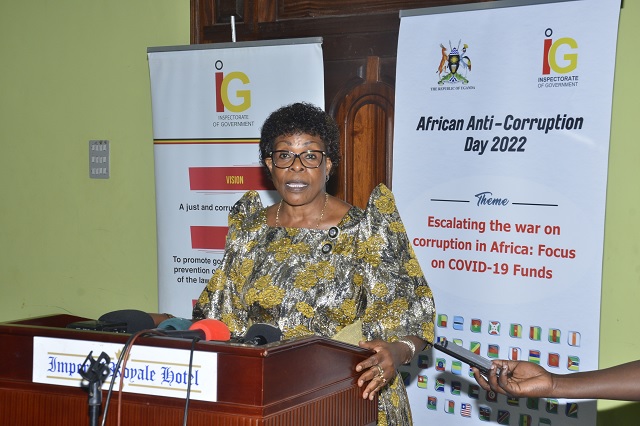
Wakiso, Uganda | THE INDEPENDENT | The Inspectorate of Government-IG has started investigations into the sprouting buildings in Wakiso district. This follows reports from whistleblowers that some of the structures are owned by public servants engaged in illicit accumulation of wealth.
Speaking on Tuesday at a meeting with Wakiso district officials, the Inspector General of Government-IGG Beti Kamya asked officials from the district to submit to the Inspectorate, the building plans of all structures being constructed in the district to aid with investigations.
Kamya acknowledged that despite the challenges posed by the COVID- 19, several people are reported to have made huge investments from budgets intended for COVID-19 activities.
Kamya last year launched the lifestyle audit to be used in the fight against corruption. The method involves the inspectorate auditing the lifestyle of government officials and their earnings in order to arrest those whose wealth is not commensurate to their earnings from salary and other legitimate sources of income like business and inheritance.
According to a 2021 report by the Inspectorate of Government-IG, Uganda loses over 20 trillion Shillings to corruption annually. This is loss by way of bribery, embezzlement, absenteeism, and abscondment from duty among other acts that public servants and political leaders engage in costing the country.
The Director of the leadership Code at the Inspectorate Annet Twine says that they have already written to some accounting officers including town clerks in Wakiso asking them to submit the building plans for the Inspectorate to investigate the owners of the high-rising buildings.
The Wakiso district LCV chairperson Matia Lwanga Bwanika accused leaders of fueling corruption in the district. He said that there are conflicts between the technocrats and politicians which have affected service delivery.
According to Bwanika, leaders demand bribes from the technocrats to pass some budgets.
Bwanika says that the government has failed to fully decentralize service delivery which has encouraged corruption as officers seek to deliver services. He referred to the policy requiring local governments to collect revenue and send it to the consolidated fund before it can be sent back for expenditure.
Justine Mbabazi, the Resident District Commissioner Wakiso noted that some civil servants have overstayed at a station, for more than 20 years and have used their positions to engage in corruption.
Mbabazi proposes that a civil servant serves at a particular local government for a maximum of ten years and is transferred.
Mbabazi says that her office has made several attempts to fight corruption but has hit a snag due to sabotage from some leaders.
Several accounting officers who attended the meeting declined to share their experience handling resources in the districts.
However, those who spoke on condition of anonymity told URN that because the districts receive little money from the Central government and yet local collections sent to the consolidated fund take long to be remitted back, local governments scramble for finances.
Another accounting officer said that they receive inadequate salaries yet they manage huge chunks of funds, which tempts them to use their positions to seek ways to earn an extra income.
In May, three officials from Wakiso were arrested during field monitoring tours in the district conducted by the Minister for Economic Monitoring Peter Ogwang and the State House Anti-corruption unit.
*****
URN
 The Independent Uganda: You get the Truth we Pay the Price
The Independent Uganda: You get the Truth we Pay the Price



